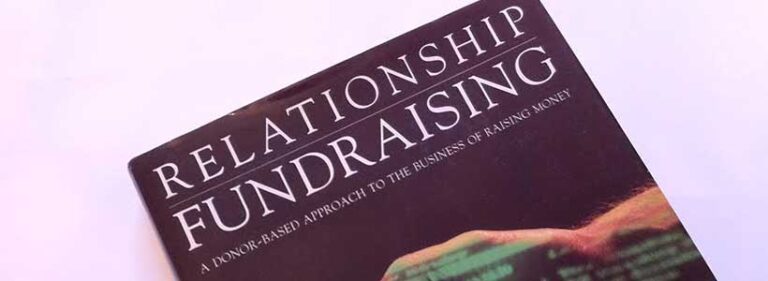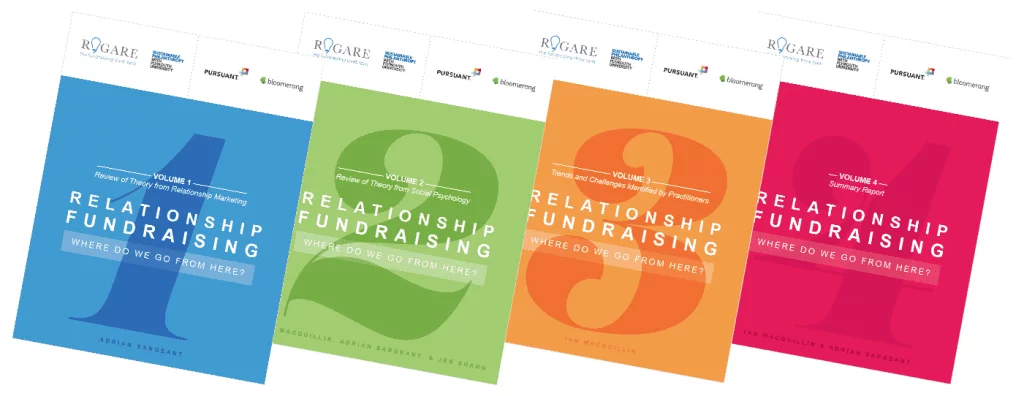Academic review of relationship fundraising offers new ideas for fundraisers

A year-long international review of relationship fundraising by Rogare, the fundraising think tank at Plymouth University’s Centre for Sustainable Philanthropy, has suggested a number of ways in which fundraisers might make more of the established discipline.
The review, funded by US donor management software company Bloomerang and American fundraising agency Pursuant, was conducted by Adrian Sargeant, Ian MacQuillin and Jen Shang.
1. Focus – relationship fundraising for all or just major donors?
The review highlighted differences in how British and American fundraisers understand and apply relationship fundraising.
In the USA relationship fundraising tenets are mainly applied to major gift fundraising, focusing primarily on the relationship with the donor, almost to the point of discounting the donation.
In the UK the concept is applied to a much wider range of donors through direct marketing techniques, as well as major gifts, corporate, legacy and trust fundraising. It is focused on maximising sustainable long-term income for the charity.
2. Where does relationship fundraising begin and customer care end?
These different interpretations raise the question for UK fundraisers whether relationship fundraising ideas should be applied to all donors. Rogare’s review argues that there is little evidence to show that relationship marketing, with its focus on pre-eminent customer needs, works in a mass consumer environment. Indeed, it questions whether consumers even want such relationships with the companies they buy from.
Rogare suggests that a more ‘transactional’ form of fundraising might be more effective and relevant in fundraising from individuals, with relationship fundraising tenets being applied to donors who have a much higher level of involvement with the charity, such as corporate and high net worth individuals.
Not that the majority of individual donors need be downgraded in any way. It is just that ‘good old fashioned’ excellent customer care might be a more effective approach for mass marketing fundraising.

The relationship fundraising review is published in four volumes.
Advertisement
3. Using academic theory from social psychology to meet donor needs
The review has also identified how current theories of relationship building and maintenance from social psychology could be transferred to donor relationships. These could be applied to foster their commitment to, trust in and satisfaction with their relationship with the organisations they support.
The report’s authors argue that two theories are important in the future of relationship fundraising:
• Identity Theory – creating a sense of identity for the donor with the charities they support
• moving relationships from exchange to communal relationship – meaning moving from a situation in which partners keep track of reciprocated costs and benefits to one where they care about each others’ needs and wants as if they were their own.
4. From RFV to commitment, trust and satisfaction
Rogare argues that financial metrics such as Recency Frequency Value (RFV) analysis and annual income targets are not as good indicators as commitment, trust and satisfaction in terms of driving customer and donor loyalty and their lifetime value. The authors assert that this is true whether charities use a relational or transactional approach, or a combination of them.
As a result, Rogare “strongly recommends that fundraisers develop bespoke metrics with which to measure relationship fundraising that focuses on these three factors, but particularly satisfaction”.
In addition, it proposes that charities “should remunerate their fundraisers according to how satisfied they make their donors feel”.
5. Aim for total relationship fundraising
Rogare’s research confirmed that, while most fundraisers were very clear on the need to build relationships with donors, few felt that they received support or engagement from their colleagues or board to help them deliver relationship fundraising. The emphasis on budget for short-term transactional techniques was one manifestation of this lack of support.
Building a ‘culture of philanthropy’ at their organisation was seen by some as one way forward in tackling this.
Yet fundraisers themselves often did not consider building relationships with other stakeholders, such as fundraising agencies or the board, that might help achieve this.
Rogare’s suggested solution is to aim for ‘total relationship fundraising’. This would focus on building relationships with all stakeholders (such as media, suppliers and regulators) to enable organisations to develop a better relationship with their supporters.
“Rogare’s research gives us a new playbook”
Jay Love, co-founder and CEO of Bloomerang, said of the review’s findings:
“In her foreword to the second edition of Ken Burnett’s groundbreaking book Relationship Fundraising, Jennie Thompson wrote that fundraising ‘is people giving to people, the hope of a shared dream, the success of a worthy cause. And it will not be effective if we continue to treat our donors simply as computer records within gift categories.
“Those of us involved with this project believe the renewed focus on relationship fundraising will be immediate and long lasting. By empowering fundraisers with the theories, frameworks and ideas to be successful, we can finally realise the true potential of Ken’s groundbreaking principles.”
Trent Rickler, CEO of Pursuant, added:
“Yogi Berra once said ‘in baseball, you don’t know nothing’. Nonprofits around the world have been practicing relationship fundraising for 30 plus years, and in some respects, it’s like baseball – we don’t know nothing. As soon as the fog begins to clear, the world changes, along with the mindsets and motivations of donors everywhere.
“Rogare’s research gives us a fresh playbook. It unpacks qualities important to both ‘relationship’ and ‘fundraising’, with actionable insights vital to development success today. As a proud sponsor of this study, may this work help you enrich your donor relationships and find greater meaning in the important work you do.”
Summing up the year-long research project, Rogare’s director Ian MacQuillin said:
“It is absolutely essential that relationship fundraising draws on the latest relevant theory to continually refresh and reinvigorate the ways it can deliver the best possible experience for the donor. This has been lacking over the past 20 or so years but is imperative to ensure relationship fundraising does not stagnate in the future and become little more than a fundraising ideology.
“Members of our advisory group said the relationships they had with colleagues were not sufficiently strong to allow relationship fundraising to flourish. So fundraisers must think beyond the donor and start improving all those relationships that are currently impinging on the donor relationships, particular with CEOs, board and their supplier agencies.
“The onus is on fundraisers to build these relationships to foster the culture of philanthropy, as it seems unlikely that the impetus will come from elsewhere.”
Download the brand new research that answers: how do donors want to be approached? https://t.co/WCRAyCcBp9 pic.twitter.com/5XQq1ZU1Vy
— Pursuant (@Pursuant) January 22, 2016



